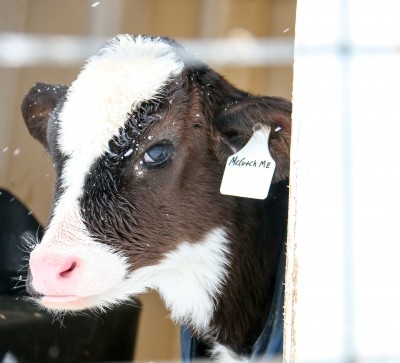Preparing for Dairy Calf Care in Winter
Alycia Drwencke, Dairy Management Specialist
Southwest New York Dairy, Livestock and Field Crops Program

Preparing for Dairy Calf Care in Winter
Cornell Cooperative Extension shares best management practices for dairy calf care during cold weather
By Alycia Drwencke, Dairy Management Specialist, with the SWNY Dairy, Livestock, and Field Crops Program
SOUTHWEST, NY (November 5, 2020) - Cornell Cooperative Extension's Southwest New York Dairy, Livestock, and Field Crops Program shares best management considerations for taking care of dairy calves in cold weather.
With temperatures dropping and the first snow flying, it is important to confirm farms are ready for the winter. While animal care is a top priority for dairy farms year round, there are some additional considerations to keep in mind during cold months, especially for vulnerable groups like calves. Ensuring our calf care is up to date for the winter season can set them up for success in the future.
There are three top considerations for calves during the winter: maintaining body temperature, ventilation, and nutrition. While these areas are important year-round, they become even more critical in cold weather. Beginning with body temperature, calves are born with only 2-4% body fat, making them susceptible to freezing. Providing calves an adequate amount of clean, soft, dry bedding can help them stay warm. In cold weather, it is recommended to provide calves with straw that is deep enough they can nestle into. The University of Wisconsin has developed a nesting score card which describes a score of 3 as ideal for winter where the calves legs should generally not be visible when they lay down. Additionally, calf coats or jackets can be put on in extreme weather, but should be examined for proper fit, dryness, and cleanliness.
Monitoring ventilation during winter is important for preventing an increase of dust, moisture, pathogens, risk of pneumonia, and other respiratory issues. Providing good ventilation at a rate of 4 air exchanges per hour while avoiding drafts is critical to promoting calf health. Some farms choose to move calves from an outdoor housing system into a barn for additional weather protection. This can be a useful management tool if ventilation in the barn is sufficient. Farms that continue to utilize outdoor based systems should ensure calves have protection from strong winds with plenty of soft, dry bedding.
Finally, it is important to increase the quantity of milk calves receive for growth and warmth. Additional calories are burned by calves in the winter to keep warm, making an increased milk quantity without compromising quality vital. Calves can consume 16 liters of milk per day with no negative health effects. Calves are also susceptible to dehydration during cold weather, making water provision essential. A plan for providing calves with clean, fresh, non-frozen water should be communicated with all caretakers.
Providing additional care to calves during the winter, especially in the areas of maintaining body temperature, ventilation, and nutrition can set a dairy herd up for success. For more information about caring for dairy calves in the winter, contact Alycia Drwencke, Dairy Management Specialist, at 517-416-0386 or amd453@cornell.edu.
Upcoming Events
Crops, Cows & Critters - Southwest New York Dairy, Livestock & Field Crops Newsletter Sponsorship
December 19, 2025
Our two forms of publications feature research-based and timely information from our four specialists, listed to the right, along with local event notifications and Cornell University outreach. This information is provided to participants who range from dairy, livestock, and field crops producers to agricultural suppliers and consultants.
Weekly Email Update: Shared with 625+ households who have signed up with our program.
Monthly Paper Mailer: To reach our stakeholders and farmers who lack internet access, we send out a monthly mailer where your company's logo and contact information would be featured with a mailing list of 330+ households.
If you sponsor our weekly and monthly publications you reach approximately 955 households.
Visit our website to view our newsletters!
2025 Cornell Food Beverage & Animal Feed Manufacturer Survey
December 19, 2025
Industry and Educational Advocates for New York State's Food, Beverage, and Animal Feed Manufacturing industries:
As you know, NYS has a diverse food and beverage manufacturing industry, in both the types of industries that exist and the wide distribution of firms by scale. Many manufacturing firms have strong backward linkages to agricultural production sectors in the state that support both farm-level and downstream food industry firms and consumers. In collaboration with the New York State Department of Agriculture and Markets, a team from Cornell University's Charles H. Dyson School of Applied Economics and Management has recently rolled out the 2025 New York State Food, Beverage, and Animal Feed Manufacturer Survey. The industry will benefit from an updated assessment of the industry that informs private and public investments and opportunities to support firm growth and improved profitability.
Cornell Organic Field Crops & Dairy Conference
March 6, 2026
Waterloo, NY
Farmers, researchers, educators, and agricultural service providers from across the Northeast are invited to the 2026 Cornell Organic Field Crops & Dairy Conference, held Friday, March 6, 2026, from 8:00 a.m. to 4:30 p.m. at the Lux Hotel & Conference Center in Waterloo, N.Y.
Co-hosted by New York Soil Health and Cornell CALS, the annual conference brings together leaders in organic grain, dairy, and livestock systems to share practical tools, new research, and farmer-tested strategies to support resilient and profitable organic production.
Announcements
No announcements at this time.





